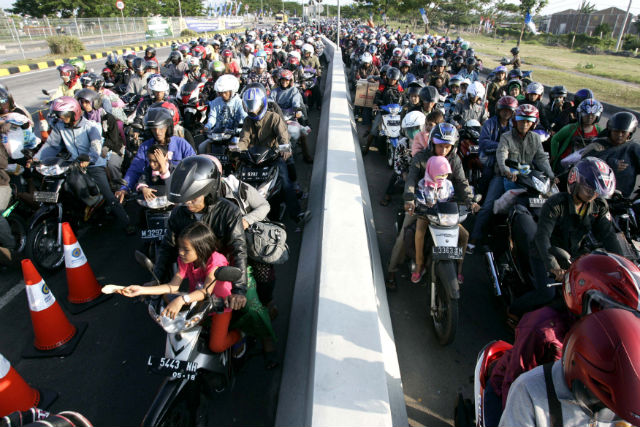SUMMARY
This is AI generated summarization, which may have errors. For context, always refer to the full article.

JAKARTA, Indonesia – Roads, boats, trains and planes leading out of Jakarta and other cities in Indonesia are now clogged with travelers headed home for the annual homecoming known as mudik.
The goal is to arrive at their hometowns by any means necessary to celebrate the country’s biggest holiday – the Eid al-Fitr celebrations that mark the end of Ramadan – with their families. The fasting month is expected to end on Monday, July 28, but the exact time and date is determined based on moon sightings.
Travelers began leaving earlier this week, but authorities expect the peak of the exodus of some 30 million Indonesians from urban areas to occur on Thursday and Friday, July 24 and 25.
As Indonesia is home to the world’s largest Muslim population – almost 9 out of every 10 Indonesians are Muslim – the annual homecoming exercise is a major event that authorities prepare for. The presence of police and transportation officials is increased, drug tests are carried out on bus drivers, special help centers are set up for motorists, and companies and political parties organize “mudik gratis bareng”, which essentially involves providing free buses from Jakarta to key provinces.
Pos Pengamanan Gambir dalam rangka Ops Ketupat Jaya 2014 pic.twitter.com/zX1FTxLcpZ
— TMC Polda Metro Jaya (@TMCPoldaMetro) July 24, 2014The Transportation Ministry has even created an official app to guide people safely home.
untuk mudik anda sila diinstall #PedomanMUDIK pic.twitter.com/xXArfJK7nS cc: @PedomanNEWS
— Fadjroel Rachman (@fadjroeL) July 24, 2014Advice from local governments on how to check vehicles before a long drive home such as this also circulate.
Taruwit yg mudik pakai mobil juga jangan lupa dicek dulu mobilnya ya. Semoga selamat sampai tujuan! 🙂 pic.twitter.com/VwqI7uNYPR
Despite all the preparations, though, the sheer volume of travelers always overwhelms the transportation infrastructure. On Thursday morning, toll roads out of Jakarta were already jammed. In previous years, motorists have reported getting stuck on roads leading to ports for 6-8 hours.
10.56 Kondisi lalu lintas keluar pintu tol Sadang terpantau padat, pic.twitter.com/akSZqn8EyE via @junet_ndalem
— TMC Polda Metro Jaya (@TMCPoldaMetro) July 24, 2014
And mudik-related accidents have already begun, with 127 incidents reported from Wednesday. Last year, 686 people died and thousands were injured in more than 3,000 road accidents during the mudik period. – Rappler.com
Add a comment
How does this make you feel?
There are no comments yet. Add your comment to start the conversation.